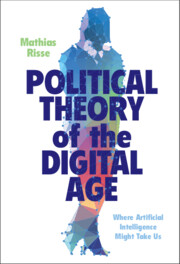2 results
1 - Introduction
-
- Book:
- Political Theory of the Digital Age
- Published online:
- 02 February 2023
- Print publication:
- 09 February 2023, pp 1-22
-
- Chapter
- Export citation

Political Theory of the Digital Age
- Where Artificial Intelligence Might Take Us
-
- Published online:
- 02 February 2023
- Print publication:
- 09 February 2023

